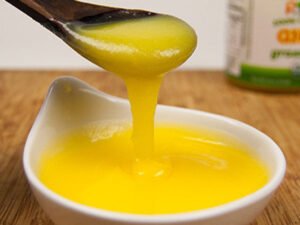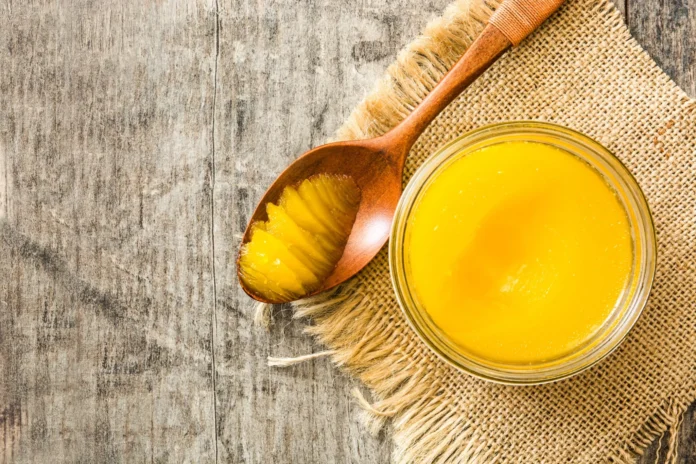Role of Ghee in Weight Loss: When it comes to weight loss, one often seeks quick solutions or magical products. Ghee, a clarified butter commonly used in Indian cooking, has gained attention for its potential role in weight management. In this article, we will explore the claims surrounding ghee for weight loss, understanding the scientific evidence, and providing practical recommendations.
Ghee is made by simmering butter to remove the milk solids and water content, leaving behind a golden, flavorful fat. Unlike butter, it contains only trace amounts of lactose and casein, making it a suitable alternative for individuals with lactose intolerance or dairy sensitivities. This is primarily composed of saturated fats, including medium-chain fatty acids (MCFAs), omega-3 fatty acids, and omega-6 fatty acids. It also contains fat-soluble vitamins such as vitamins A, E, and K.
Read this also: The Growing Concern: Junk Food Addiction Among Children
Incorporating Ghee into a Weight Loss Plan

While it alone may not be a miraculous weight loss aid, it can still be a part of a balanced diet when consumed in moderation.
1. Boosting Metabolism: Some believe that the MCFAs in ghee can enhance metabolism, leading to weight loss. There is limited scientific evidence supporting this claim. While MCFAs can be quickly absorbed and utilized for energy, their impact on overall metabolism and weight loss is considered modest.
2. Reducing Appetite: Ghee’s rich flavor and high fat content may help promote satiety and reduce cravings. However, it’s important to consume ghee in moderation, as excessive calorie consumption can hinder weight loss efforts.
3. Enhancing Gut Health: Ghee contains butyric acid, a short-chain fatty acid that may support gut health. A healthy gut microbiome is associated with better weight management. However, current research primarily focuses on the benefits of butyric acid itself, rather than specifically ghee.
Here are some tips for incorporating ghee sensibly
1. Portion Control: It is high in calories, with approximately 120 calories per tablespoon. Practicing portion control is crucial to keep calorie intake in check.
2. Healthy Cooking: Use ghee sparingly for cooking. Its high smoke point makes it suitable for various cooking methods, such as sautéing or stir-frying.
3. Combine with Nutrient-Dense Foods: Pair ghee with fiber-rich vegetables, lean proteins, and whole grains to create balanced meals that provide satiety and nourishment without excessive calorie intake.
4. Focus on Overall Lifestyle: Remember, weight loss is more than just about incorporating a specific food. A well-rounded approach involving a balanced diet, regular physical activity, and mindful eating habits is essential for sustainable weight management.
While ghee may offer certain health benefits and contribute to satiety, it is not a magical solution for weight loss. Like any other food, moderation is key. Focus on overall dietary patterns, portion control, and a healthy lifestyle to achieve your weight loss goals effectively. Always consult a registered dietitian or healthcare professional to personalize your approach based on your unique nutritional needs and goals.



